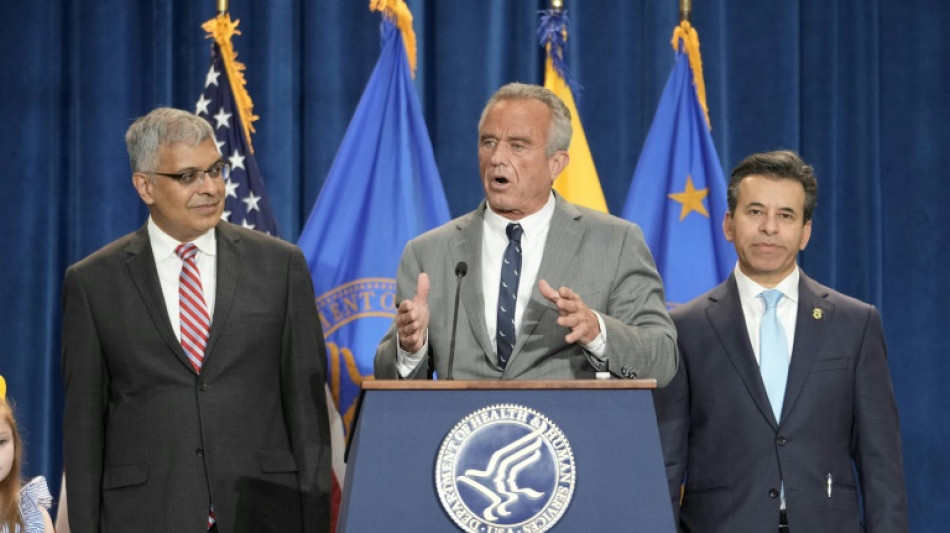
-
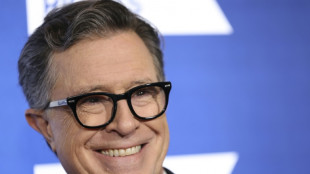 Trump says comedian Colbert should be 'put to sleep'
Trump says comedian Colbert should be 'put to sleep'
-
Mahrez leads Algeria to AFCON cruise against Sudan

-
 Southern California braces for devastating Christmas storm
Southern California braces for devastating Christmas storm
-
Amorim wants Man Utd players to cover 'irreplaceable' Fernandes

-
 First Bond game in a decade hit by two-month delay
First Bond game in a decade hit by two-month delay
-
Brazil's imprisoned Bolsonaro hospitalized ahead of surgery

-
 Serbia court drops case against ex-minister over train station disaster
Serbia court drops case against ex-minister over train station disaster
-
Investors watching for Santa rally in thin pre-Christmas trade

-
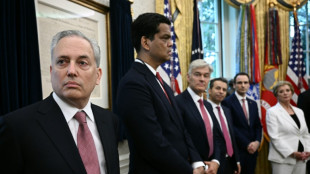 David Sacks: Trump's AI power broker
David Sacks: Trump's AI power broker
-
Delap and Estevao in line for Chelsea return against Aston Villa

-
 Why metal prices are soaring to record highs
Why metal prices are soaring to record highs
-
Stocks tepid in thin pre-Christmas trade

-
 UN experts slam US blockade on Venezuela
UN experts slam US blockade on Venezuela
-
Bethlehem celebrates first festive Christmas since Gaza war

-
 Set-piece weakness costing Liverpool dear, says Slot
Set-piece weakness costing Liverpool dear, says Slot
-
Two police killed in explosion in Moscow

-
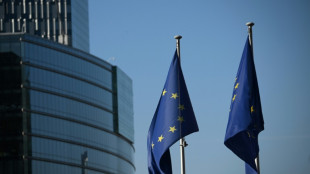 EU 'strongly condemns' US sanctions against five Europeans
EU 'strongly condemns' US sanctions against five Europeans
-
Arsenal's Kepa Arrizabalaga eager for more League Cup heroics against Che;sea

-
 Thailand-Cambodia border talks proceed after venue row
Thailand-Cambodia border talks proceed after venue row
-
Kosovo, Serbia 'need to normalise' relations: Kosovo PM to AFP

-
 Newcastle boss Howe takes no comfort from recent Man Utd record
Newcastle boss Howe takes no comfort from recent Man Utd record
-
Frank warns squad to be 'grown-up' as Spurs players get Christmas Day off

-
 Rome pushes Meta to allow other AIs on WhatsApp
Rome pushes Meta to allow other AIs on WhatsApp
-
Black box recovered from Libyan general's crashed plane

-
 Festive lights, security tight for Christmas in Damascus
Festive lights, security tight for Christmas in Damascus
-
Zelensky reveals US-Ukraine plan to end Russian war, key questions remain

-
 El Salvador defends mega-prison key to Trump deportations
El Salvador defends mega-prison key to Trump deportations
-
Stranger Things set for final bow: five things to know

-
 Grief, trauma weigh on survivors of catastrophic Hong Kong fire
Grief, trauma weigh on survivors of catastrophic Hong Kong fire
-
Asian markets mixed after US growth data fuels Wall St record

-
 Stokes says England player welfare his main priority
Stokes says England player welfare his main priority
-
Australia's Lyon determined to bounce back after surgery

-
 Stokes says England players' welfare his main priority
Stokes says England players' welfare his main priority
-
North Korean POWs in Ukraine seeking 'new life' in South

-
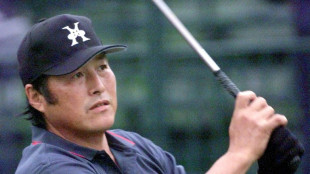 Japanese golf star 'Jumbo' Ozaki dies aged 78
Japanese golf star 'Jumbo' Ozaki dies aged 78
-
Johnson, Castle shine as Spurs rout Thunder

-
 Thai border clashes hit tourism at Cambodia's Angkor temples
Thai border clashes hit tourism at Cambodia's Angkor temples
-
From predator to plate: Japan bear crisis sparks culinary craze

-
 Asian markets mostly up after US growth fuels Wall St record
Asian markets mostly up after US growth fuels Wall St record
-
'Happy milestone': Pakistan's historic brewery cheers export licence

-
 Chevron: the only foreign oil company left in Venezuela
Chevron: the only foreign oil company left in Venezuela
-
US denies visas to EU ex-commissioner, four others over tech rules
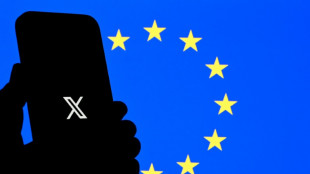
-
 SMX Is Being Valued By Monetizing Certainty, Not Sustainability Narratives
SMX Is Being Valued By Monetizing Certainty, Not Sustainability Narratives
-
SMX Is Earning Validation, and Valuation, Through Industrial Proof, Not Promises

-
 SMX's Valuation Is Anchored in Fixing a Structural Supply-Chain Failure Markets Learned to Ignore
SMX's Valuation Is Anchored in Fixing a Structural Supply-Chain Failure Markets Learned to Ignore
-
2026 Payer IT Outsourcing Outlook: Outcome-Based Managed Services, Production-Grade GenAI Governance, and Vendor-Risk Enforcement

-
 Gold's Quiet Molecular-Level Reckoning Is Happening Outside the Spotlight
Gold's Quiet Molecular-Level Reckoning Is Happening Outside the Spotlight
-
SMX Is Transitioning From Single Deployments to Supply-Chain Infrastructure

-
 Each SMX Partnership Opens a Market, the Portfolio Multiplies the Value
Each SMX Partnership Opens a Market, the Portfolio Multiplies the Value
-
CORRECTION: Nextech3D.ai Provides Shareholder Update on Krafty Labs Acquisition and Announces $321,917 CEO Investment


Trump's administration moves to scrap artificial food dyes
President Donald Trump's administration on Tuesday announced plans to remove synthetic dyes from the US food supply, marking a rare point of bipartisan convergence in an otherwise sharply divided political climate.
Health Secretary Robert F Kennedy Jr. has vowed to overhaul America's food system under the banner of his "Make America Healthy Again" (MAHA) agenda, and the push would phase out the eight approved artificial food dyes by the end of 2026.
It builds upon a prohibition on Red Dye 3 by the government of former president Joe Biden but accelerates the timeline and also calls on the National Institutes of Health to carry out comprehensive research on how additives impact children's development.
"For the last 50 years, American children have increasingly been living in a toxic soup of synthetic chemicals," Food and Drug Administration commissioner Marty Makary said at a news conference, surrounded by young families and MAHA supporters.
He cited studies linking synthetic dyes to conditions including attention deficit hyperactivity disorder (ADHD), diabetes, cancer, genomic disruption, gastrointestinal issues and more.
Kennedy, for his part, called the issue of dyes and additives more generally an "existential" threat.
"When my uncle was president in the 1960s, we had the healthiest people in the world -- and one of the basic assumptions of our country was that because we were robust people... that was responsible for our country being the land of the brave and the home of the free," he said.
Of the eight synthetic dyes derived from petroleum, Yellow 5, Yellow 6 and Red 40 make up the lion's share of those in use, Peter Lurie, president and executive director of the nonprofit Center for Science in the Public Interest, told AFP.
They are found in a range of products, from beverages and candies to cereals, sauces and dairy products.
Under the new plan, the FDA would revoke authorization for two of the eight dyes, while relying on the food industry to voluntarily eliminate the other six, but Kennedy said they have been receptive in talks.
"None of them convey anything of any nutritional significance, and what they're really there for is to mislead -- to make food appear somehow redder, somehow bluer, somehow fruitier or more attractive than it is," said Lurie.
"And the purpose of all that is to drive up sales, it's not anything that benefits the American public."
- Bipartisan momentum -
Momentum has been building at the state level. In March, Republican-leaning West Virginia enacted a broad ban on synthetic dyes, following California's 2024 decision to restrict them in public schools.
While Red Dye 3 was previously targeted for phaseout in foods and drugs by 2027 and 2028 respectively due to cancer concerns, the remaining dyes have been linked to behavioral issues such as attention deficit disorder in children.
In Europe, these dyes are not banned outright -- but the requirement to carry warning labels has led many companies to switch to natural alternatives.
Kennedy's stance puts him in rare alignment with mainstream scientific consensus -- a shift from his controversial record of promoting vaccine misinformation, downplaying the country's worst measles outbreak in years, and suggesting bird flu should be allowed to spread naturally among poultry.
Still, opposition from the food industry may yet surface. Manufacturers have long resisted tighter regulations, though Kennedy insisted they are ready to adapt.
"They want clear guidelines, they want to know what they can and can't do, and we're going to give them that," he said.
Lurie remained skeptical.
"All I know is that industry wasn't up there on the podium," he said. "If they were so clearly on board, you have to ask yourself why they weren't there."
P.Silva--AMWN


